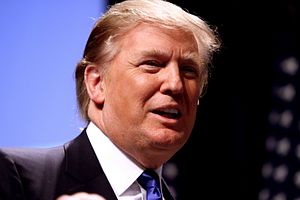After ascending to the White House on January 20, 2017, as the new president of the United States, Donald Trump will have to deal with many foreign policy challenges. One of them is the long-standing Afghan conflict, which is the longest war in U.S. history. Though during the election campaign period both he and his opponent, Hillary Clinton, hardly mentioned the Afghan quagmire, President-elect Donald Trump cannot ignore the actual importance of Afghanistan, especially given the massive U.S. investment of blood and treasure there since 2001.
So far, it remains difficult to predict what Trump is chalking out for Afghanistan and the region, but given statements in 2011, when U.S. commandos killed Osama bin Laden in Abbottabad, a leafy garrison town 35 miles away from the Pakistani capital, we can glean some insight into his thinking about the region. After the bin Laden raid, he mentioned on Twitter that Pakistan was harboring terrorists and owes the United States an apology.
“When will Pakistan apologize to us for providing safe sanctuary to Osama bin Laden for 6 years?! Some ‘ally’,” tweeted Trump. Likewise, in May, Trump stated in an interview with Fox news that as president, he would prefer to keep nearly 10,000 U.S. troops in Afghanistan “because it’s adjacent and right next to Pakistan which has nuclear weapons.” (The current number stands at 8,400, set to decrease even more.)
These Trump statements have already created tensions in Islamabad, which is viewed by many Afghan and U.S. officials as they key backer of the Afghan Taliban, who have extensively targeted American soldiers over the course of the last 15 years in Afghanistan.
Political commentators and experts in Afghanistan are less optimistic about any significant changes in U.S. policy toward Afghanistan and Pakistan, citing the institutional nature of U.S. policy formulation. Trump’s campaign was largely focused on domestic issues such as immigration and the economy, which also hints that Afghanistan may not be at the top of his list of priorities. Some in Kabul are even worried that the new Washington administration would reduce its involvement in Afghanistan, referencing Trump’s general distate for U.S. involvement in the affairs of other countries.
However, there is also a level of optimism in Kabul. The Afghan public expects the new administration will change its policy toward Afghanistan by forcing Pakistan to deal with terrorist sanctuaries and pressure the Taliban to come to the negotiation table or face the consequences. This argument is backed by a Trump adviser’s comments in an interview that appeared in Reuters. According to Shalabh Kumar, an Indian-American businessman who is advising Trump, the president-elect is “acknowledging that Pakistan is a perpetrator of terrorism.”
Additionally, the well-known Afghan-American diplomat Zalmay Khalilzad is said to be a key man for Trump as well. Khalilzad has been very vocal about the dubious role that Pakistan plays in the war on terror — in particular vis-a-vis its dealings with Afghanistan. His influence and closeness with Trump might play a significant role in shifting U.S. policy toward Afghanistan and Pakistan.
For Trump, the foremost challenge in Afghanistan would be to bring peace to the war-torn country by dealing with the Taliban, which has so far not responded seriously to U.S. and Afghan calls for peace talks. By the same token, the United States has found it difficult to defeat the group militarily and also put an end to its mission in Afghanistan successfully.
Furthermore, it is imperative for the new administration in Washington to stay firmly behind Afghan President Ashraf Ghani’s peace deal with the notorious Gulbuddin Hekmatyar and extend its support in the implementation of the deal. If this succeeds, the Hezb-i-Islami (Hekmatyar’s militant organization) can return to mainstream Afghan politics and encourage the Afghan Taliban to come to the negotiating table as well. In this regard, it is worth emphasizing that Pakistan’s role is critical in bringing the Taliban to the negotiating table.
Finally, the newly elected U.S. president needs to continue the country’s engagement with Afghanistan by staying committed to the pledges made by the Obama administration at the Warsaw and Brussels Conferences in 2016. Obama exercised an indecisive policy toward Afghanistan, whereby he changed the time frame for accomplishing various withdrawal milestones for U.S. forces in Afghanistan. This encouraged the insurgents and their backers to prefer continued insurgency to peace talks. It will be critically important for the Trump administration to lay out long-term plans for U.S. engagement in Afghanistan.
More importantly, Trump needs to increase the engagement of China, India, Iran, Russia, and other Central Asian countries to play constructive roles in bringing peace to Afghanistan. It is worth mentioning that Russia and Iran have also started cooperating with the Afghan Taliban in a bid to block gains by the Islamic State (ISIS) in Afghanistan. This will also have adverse implications for the Afghan government, which is the primary player fighting ISIS in the country.
Overall, there is a general belief among Afghans that existing U.S. policies may not bring peace to war-torn Afghanistan, as they are not focused on the root causes of the Afghan conflict, chief among them being Pakistani support to the insurgent group. Afghans expect Trump to put pressure on Pakistan to put an end to the insurgency in their country.
Aziz Amin Ahmadzai writes on political, security and social issues in South Asia, West, and Central Asia. He is a Chevening Scholar and is currently studying Conflict, Security, and Development at Lancaster University. He tweets at @azizamin786.
Ziauddin Wahaj is an AusAID Scholar and has a postgraduate degree from University of Adelaide. He tweets at @wahajzia
































